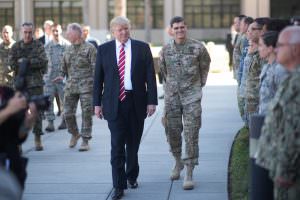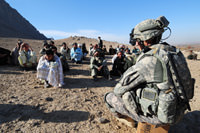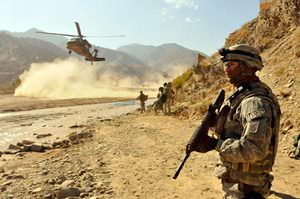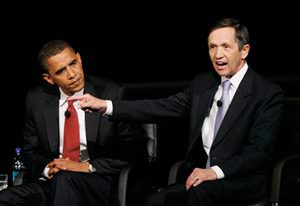Tag — It’s Your Problem
The next six months in Iraq are crucial -- and always will be. That noise you heard Monday on Capitol Hill was the can being kicked further down the road leading to January 2009, when George W. Bush gets to hand off his Iraq fiasco to somebody else.WASHINGTON — The next six months in Iraq are crucial — and always will be. That noise you heard Monday on Capitol Hill was the can being kicked further down the road leading to January 2009, when George W. Bush gets to hand off his Iraq fiasco to somebody else.
It’s clear by now that playing for time is the real White House strategy for Iraq. Everything else is tactical maneuver and rhetorical legerdemain — nothing up my sleeve — with which the administration is buying time, roughly in six-month increments. Appearing before a joint hearing called by the House Armed Services and Foreign Affairs committees, Gen. David H. Petraeus probably won Bush the respite he wanted when he said that U.S. military objectives “are in large measure being met.”
Never mind whether those objectives make sense. Oh, and if anyone mentions that Congress is supposed to decide what wars this nation fights, not generals or diplomats? Attack them for impugning our nation’s finest — and give that can another kick.
Remember when the Decider asked for his troop escalation — calling it a “surge” — and explained what he was trying to achieve? The idea, back in March, was that 21,500 additional pairs of boots on the ground would so dramatically improve the security situation, especially in Baghdad, that the “unity” government headed by Prime Minister Nouri al-Maliki could take dramatic steps toward political reconciliation. That was the key — a political settlement that would mark the beginning of the end of a de facto sectarian civil war.
Just give us until September and you’ll see, Bush promised. Six months.
Well, for the record, the number of extra troops ended up being more like 30,000. And it turned out that the Shiite-dominated government had neither the wherewithal nor the inclination to fashion an equitable deal with the Sunni minority on issues such as how to share oil revenues. Various Sunni and Shiite factions made clear they had no faith in Maliki as a leader or an honest broker. Far from improving, the political situation in Iraq deteriorated markedly.
U.S. officials say that sectarian killings in Baghdad have declined, but journalists point out that many neighborhoods have already been subjected to ethnic cleansing. Petraeus showed Congress a chart Monday demonstrating that civilian deaths nationwide had fallen — but didn’t mention that most of the decline came before the “surge” troops arrived. Meanwhile, according to the United Nations, an estimated 60,000 refugees are fleeing the country each month.
But Petraeus, Bush’s handpicked commander, intelligently recognized that something interesting was happening in Anbar province, once a deadly haven for Sunni insurgents and al-Qaida terrorists. Sunni tribal sheiks were getting fed up with the al-Qaida foreigners and seemed ready to kick them out.
Petraeus did everything he could to encourage this trend, pouring largess into Anbar to forge new relationships with warlords who used to be bitter enemies. Once the local Sunni leaders decided — for now — they would rather work with the Americans than shoot at them, attacks on U.S. forces in the province fell sharply.
However, this works directly against the “strategy” of counting on the central government in Baghdad to work everything out. Maliki initially reacted with alarm at seeing the Americans strengthen the hand of the Sunnis in Anbar. Unable to do anything about it, he changed tactics and tried to take credit for the drop in violence.
One funny thing about the improved security situation that Petraeus and Ambassador Ryan Crocker described: Iraqis don’t seem to have noticed.
In a poll of Iraqis commissioned by ABC News, the BBC and the Japanese network NHK — released Monday before Petraeus’ testimony — 31 percent of Iraqis said security in their local areas had worsened over the past six months, as opposed to just 24 percent who said it had improved. A full 61 percent said security had worsened in the country overall, against only 11 percent who said it had improved. Only 22 percent said things in general were going well in Iraq (down from 44 percent in November 2005), and just 23 percent thought things would get better over the coming year (as opposed to 69 percent in 2005).
Some 63 percent of Iraqis polled said the U.S. invasion was wrong, 47 percent said that coalition forces “should leave now,” and 57 percent said attacks on U.S. forces were “acceptable.”
Never mind what the Iraqis think. On with the new new strategy, which is to bypass the national government and work from the bottom up, making deals with local power brokers. That should be good for, what, another six months?
Eugene Robinson’s e-mail address is eugenerobinson(at)washpost.com.
© 2007, Washington Post Writers Group
Your support matters…Independent journalism is under threat and overshadowed by heavily funded mainstream media.
You can help level the playing field. Become a member.
Your tax-deductible contribution keeps us digging beneath the headlines to give you thought-provoking, investigative reporting and analysis that unearths what's really happening- without compromise.
Give today to support our courageous, independent journalists.





You need to be a supporter to comment.
There are currently no responses to this article.
Be the first to respond.